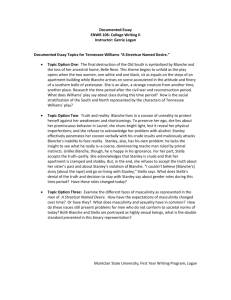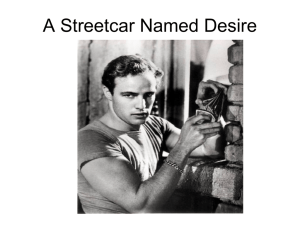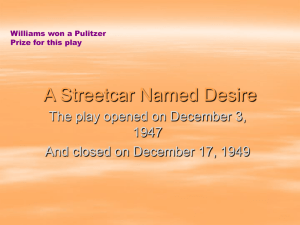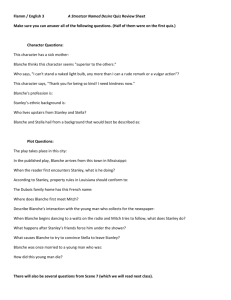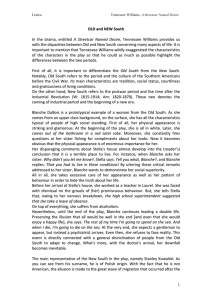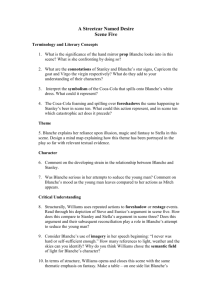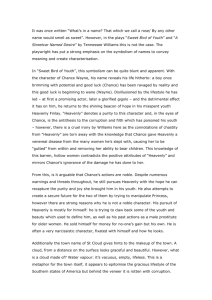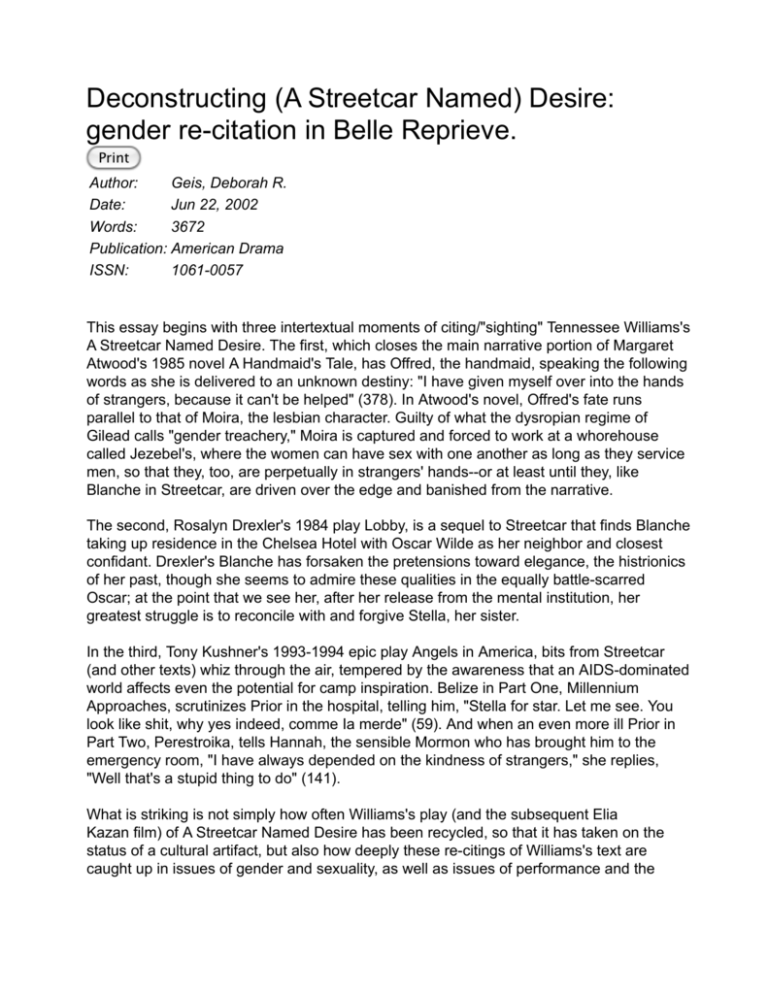
Deconstructing (A Streetcar Named) Desire:
gender re-citation in Belle Reprieve.
Print
Author:
Geis, Deborah R.
Date:
Jun 22, 2002
Words:
3672
Publication: American Drama
ISSN:
1061-0057
This essay begins with three intertextual moments of citing/"sighting" Tennessee Williams's
A Streetcar Named Desire. The first, which closes the main narrative portion of Margaret
Atwood's 1985 novel A Handmaid's Tale, has Offred, the handmaid, speaking the following
words as she is delivered to an unknown destiny: "I have given myself over into the hands
of strangers, because it can't be helped" (378). In Atwood's novel, Offred's fate runs
parallel to that of Moira, the lesbian character. Guilty of what the dysropian regime of
Gilead calls "gender treachery," Moira is captured and forced to work at a whorehouse
called Jezebel's, where the women can have sex with one another as long as they service
men, so that they, too, are perpetually in strangers' hands--or at least until they, like
Blanche in Streetcar, are driven over the edge and banished from the narrative.
The second, Rosalyn Drexler's 1984 play Lobby, is a sequel to Streetcar that finds Blanche
taking up residence in the Chelsea Hotel with Oscar Wilde as her neighbor and closest
confidant. Drexler's Blanche has forsaken the pretensions toward elegance, the histrionics
of her past, though she seems to admire these qualities in the equally battle-scarred
Oscar; at the point that we see her, after her release from the mental institution, her
greatest struggle is to reconcile with and forgive Stella, her sister.
In the third, Tony Kushner's 1993-1994 epic play Angels in America, bits from Streetcar
(and other texts) whiz through the air, tempered by the awareness that an AIDS-dominated
world affects even the potential for camp inspiration. Belize in Part One, Millennium
Approaches, scrutinizes Prior in the hospital, telling him, "Stella for star. Let me see. You
look like shit, why yes indeed, comme Ia merde" (59). And when an even more ill Prior in
Part Two, Perestroika, tells Hannah, the sensible Mormon who has brought him to the
emergency room, "I have always depended on the kindness of strangers," she replies,
"Well that's a stupid thing to do" (141).
What is striking is not simply how often Williams's play (and the subsequent Elia
Kazan film) of A Streetcar Named Desire has been recycled, so that it has taken on the
status of a cultural artifact, but also how deeply these re-citings of Williams's text are
caught up in issues of gender and sexuality, as well as issues of performance and the
performative. Of queerness and the attachment to cultural objects, Eve Sedgwick writes in
Tendencies, "We needed for there to be sites where the meanings didn't line up tidily with
each other, and we learned to invest those sites with fascination and love" (3). Perhaps
some of the "fascination" of Streetcar is the number of these sites--masculinity, femininity,
madness, desire--where these slippages of meanings, what Sedgwick would term
excesses, tend to occur: where the lines don't fall neatly into place. The trajectory of desire
supposedly ends, as Blanche knows, in death (a trope that takes on new significance in
the age of AIDS): but do the revisited texts extend th is trajectory? Do they make it a
circular one? Or do they reject it altogether? And what of the audience, the "desiring
bodies"--those strangers upon whose kindness the performers depend, even when that's a
"stupid thing to do"? These are some of the questions taken up by an explicitly queer,
decidedly deconstructive re-vision of Streetcar that is my fourth intertext and the focus of
this discussion, Bloolips's and Split Britches's collaborative play entitled Belle Reprieve.
First presented at London's Drill Hall in January 1991 and then a month later at LaMama in
New York, Belle Reprieve is a work Co-written and performed by Bette Bourne and Paul
Shaw of the gay British group Bloolips, and Peggy Shaw and Lois Weaver of Split
Britches, a lesbian-identified off-off Broadway group. By altering and reversing the gender
roles in Streetcar (Blanche is played by Bette Bourne, as "a man in a dress"; Stanley is
played by Peggy Shaw, as "a butch lesbian"; Mitch is played by Paul Shaw, as "a fairy
disguised as a man"; and Stella by Lois Weaver as "a woman disguised as a woman" [4)),
this theatrical piece creates a Brechtian commentary on the sexual roles and games in
Williams's text. Belle Reprieve's intertexts (which include the film version of Streetcar), its
moments of vaudeville, and the characters' own self-conscious attention to theatricality
extend the gendered role-playing into a deconstruction of dramatic role-playing itself. Like
Heiner Muller's Hamletmachine or like many of Char les Ludlam's works for the Ridiculous
Theater (Big Hotel, Bluebeard, etc.), Belle Reprieve's response to the past, to its theatrical
antecedents, is a complex one. Ultimately, the work is less of a parody or an adaptation of
Streetcar than it is a postmodern refashioning and a "queering" of a play that is already, as
C. W. E. Bigsby puts it, about "a culture in a state of crisis, its certainties dislocating, its
myths collapsing" (16).
Throughout Belle Reprieve, the characters/performers comment on the relationships
between the roles of gender and sexuality they play (both in this piece and in "real life"),
and the gender/sexuality of Williams's characters. Williams hints throughout Streetcar, for
instance, at Stella's sensuality: the morning after the "poker night" fight (and
tempestuous sexual reconciliation) with Stanley, we are told that as she lies on the bed
with a comic book in her hand, "[h]er eyes and lips have that almost narcotized tranquility
that is [on) the faces of Eastern idols" (62). The writers of Belle Reprieve go one step
further and play with the image of Stella's sexual drive as overdetermined and narcissistic.
In her opening speech--directed partially at herself, partially at the audience--she asks:
Is there something you want? What can I do for you? Do you know who I am, what I feel,
how I think? You want my body. My soul, my food, my bed, my skin, my hands? You want
to touch me, hold me, lick me, smell me, eat me, have me? You think you need a little
mote time to decide? Well, you've got a little over an hour to have your fill. (5)
As the object of Stanley's desire, Stella here has embraced (and refigured) her own role as
commodity; moreover, her words call attention to the audience's status as consumers, as
hungry to possess the performer, to get their "fill" of her--at least until the (performance)
time is up. As if she were aware of Williams's stage directions, Belle Reprieve's Stella
explains to Mitch, "Look, I'm supposed to wander around in a state of narcotized sexuality.
That's my part" (6). Blanche's visit brings out Stella's quasi-incestuous revelations of her
attraction to her sister, as the two don matching cheerleaders' outfits and sing about
exploring one another's bodies "under the covers" (14). But we also see the "colored
lights" of Streetcar enacted in the moments of passion between Stella and Stanley
(doubled in Brechtian fashion by the awareness of many audience members in the original
performance that Lois Weaver [Stella] and Peggy Shaw [Stanley] were real-life
lovers)--particularly when Stella pulls off Stanley's ri pped T-shirt as Stanley carries her
offstage, thus evoking Marlon Brando's Stanley in the very moment that the audience's
attention is called to Peggy Shaw's body. As Elm Diamond puts it, in an often-cited essay
on Brechtianism and feminism that has, I think, interesting applications for discussions of
queer theater as well, "Brechtian theory imagines a polyvalence to the body's
representation, for the performer's body is also historicized, loaded with its own history and
that of the character, and these histories ruffle the smooth edges of representation" (89).
In a monologue that Split Britches member Deb Margolin wrote for the play, Stella talks to
Cassandra, the seer, asking her for advice on love, and poses and sings "Running Wild"
like Marilyn Monroe, after she says to the imaginary Cassandra, "Come sweet prophetess,
what is going to happen? Tell me, I'm nailed to this story. Cut me down. I'm in here. Can't
you see me?" (22). In this sense, Stella is portrayed as a woman who is entrapped in the
limited "part" that has been written for her, yet who makes the best of it by immersing
herself in her own desires. She tells Stanley, "I know that your tension is sexual, and it's a
desire I share in, but not for your pleasure, for my own" (24). Her words mock Williams's
image of Stella as a woman who is willing to sacrifice everything for Stanley's needs (here,
even when Blanche is trying to argue Stella out of her attraction to Stanley ["I think he's a
fag," she says (27)], Stella is more interested in the taste of the Coke she is drinking,
which she conflates with he r orgasmic satisfaction: "Pure sugar, liquid sex" [27]).
Elizabeth Grosz, in an important essay on "Refiguring Lesbian Desire," argues that the
traditional psychoanalytic interpretation of desire as based on "lack" should be replaced
with an account of lesbian desire that is full, productive, predicated on presences rather
than absences--more, she says, like Gilles Deleuze's characterization of "practices and
action" than the Freudian view that links the female with objects, receptacles, emptinesses
(75). Belle Reprieve's Stella is caught between her role as desired object (thus her
evocation of Marilyn Monroe), and desiring subject; whereas Williams implies that the
characters in Streetcar are motivated by desire, by lack--again, the end (or satisfaction) of
which is death--the characters in Belle Reprieve parody and multiply their desires, making
them what Grosz would call "energies, excitations [and] impulses" (78).
It is difficult not to bring Allan--Blanche's first lover in Streetcar, who killed himself after
Blanche discovered his homosexuality--to mind as we see Mitch in Belle Reprieve flirt
alternately with Blanche (the drag queen) and with the very butch Stanley. If Mitch,
portrayed as a "mama's boy" in Williams's play, is implicitly another Allan, then Belle
Reprieve's Mitch is correspondingly only part of the way out of the closet. After he delivers
a long speech describing (in intricate detail) a vision of a man with "large bedroom eyes"
on a blue feathered throne (16), he engages in a frenzied dialogue of erotic machismo with
Stanley (which also evokes some of the homoeroticism of Williams's "poker night" scene).
When Mitch gets carried away after he and Stanley arm wrestle--"Bite me! Bite me! Suck
on me..." (17)--he has to pretend he is talking about mosquitoes, but the sequence
culminates in Stanley's song, "I'm a Man" ("spelled M ... A ... N" [19]). Mitch woos Blanche
by appearing to her above the bathtub, w earing a fairy costume and playing the ukelele;
later, in another one of the piece's tableaulike monologues that seems to be directed out
into the audience, he says:
I think it all started to go wrong when I wasn't allowed to be a boy scout. There were more
important things to be done. Vacuuming, clearing up at home, putting the garbage out...
Then one day I fell in love with a beautiful young man. He came like a messenger from
another world bearing a message of simple physical desire. But it was already too late, for
me everything about the body was bound up with pain and boredom. I even used to ear
fast because I found it so boring. Soon the boy left. ... Then I was alone. At night I would
lie awake on my bed, and imagine I could hear things. (33)
The newsboy in Streetcar, referred to by Blanche as the "young man," here becomes the
"messenger" of desire for Mitch instead-- but again, the invitation is not mutually reciprocal.
If Mitch in Streetcar is self-conscious about his body (he tells Blanche that he's ashamed
of the way he perspires [88], and that he's afraid his "heavy build" makes him look clumsy),
then Mitch in Belle Reprieve is, like Stella, both the same and the opposite: he is slight
rather than heavy, "bored" with his body, but the effect is to underscore the loneliness and
marginalization that both Mitches feel. Williams's Mitch looks on helplessly from the
sidelines at the end of Streetcar as Blanche is carted off to the asylum--but in Belle
Reprieve, Mitch and Stella join one another in singing that they're not quite the
"pushovers" (36) that Williams's text would make them our to be.
In Streetcar, when Blanche and Mitch return from their date at the amusement park on
Lake Pontchartrain (notably bearing, the stage directions say, "a plaster statuette of Mae
West" [85]), Blanche remarks to Mitch, "I don't think I've ever tried so hard to be gay and
made such a dismal mess of it." She adds, echoing the language of the carnival they have
just attended, "I get ten points for trying!" (85). Much, of course, has already been made of
the original Blanche as a "coded" gay character. John Clum calls her "in many ways the
quintessential gay character in American closet drama" (150), while David Savran points
out that original impulses to see Blanche as "only" a "female impersonator" have risked
creating what he sees as reductive or homophobic interpretations of the play, though not
necessarily so (115). More recently, Anne Fleche has suggested that it might be more
useful to see Blanche's character as an example of "the performative, constrained
enactment of gender"; Blanche, Fleche argues,
can be viewed as the representation of a woman who finally doesn't pass as a subject,
because she does her gender incorrectly, and because her hyperbolic theatricality
challenges the masculine/feminine heterosexual codes that enable and constrain gender
performativity. (266)
Blanche's identity in Belle Reprieve is triply (or perhaps quadruply) embedded: "she" is a
woman played by a man who imagines herself not just as Williams's Blanche DuBois, but
as Vivien Leigh (like Bette Bourne, a Brit) playing the role of Blanche in Kazan's movie.
These multiple visible "texts" of Blanche depend in part on being hyperbolic: just as the
"original" Blanche embodies her sexuality through the near-caricatured imagery of the
Southern Belle, Belle Reprieve's Blanche has an identity composed of surfaces, of
costumes, of performances, such that when Stanley says he is going to look through the
contents of her trunk to determine who she is, she tells the audience, "And so it was that I
set out to prove to the world that I was indeed myself." Stella says, "She threw herself at
the feet of an unforgiving world to prove her identity," and Mitch adds, "The answer was
somewhere in that trunk" (9). In other words, in a postmodern theatrical universe,
"Blanche" is inseparable from the costumes, the odds an d ends, the fragments that make
up the performance of her "identity." Williams's Blanche, herself, is a consummate actress
and role-player; Bigsby, among other critics, has characterized her as "construct[ing] her
own drama, costuming herself with care, arranging the set, enacting a series of roles,
developing her own scenario" (61). And if Bette Bourne as Blanche in drag is a comment
on what Clum and others would see as the original 'drag act' of Williams's Blanche, it is
worth keeping in mind Judith Butler's argument in Bodies that Matter that drag is
predicated in part on an awareness of the performance of difference: "What is 'performed'
in drag is, of course, the sign of gender, a sign that is not the same as the body it figures,
but that cannot be read without it" (237). In Belle Reprieve, Blanche describes herself as
feeling like "an old hotel. Beautiful bits of dereliction in need of massive renovation" (28).
As a 'renovation' of the text of Streetcar, Belle Reprieve itself reassembles the fragments o
f Blanche into what are still fragments, but ones that allow us to read them (and hence her)
differently. Stanley says to Blanche in what replaces the "rape scene,"
We're in this together, me and you. We've known that from the start. We're the extremes,
the stereotypes. We are as far as we can go. We have no choice, me and you. We've tried
it all, haven't we? We've rejected ourselves, not trusted ourselves, mirrored ourselves, and
we always come back to ourselves. We're the warriors. (35)
His words reflect Michel Foucault's sense that power and desire are "linked in a more
complex and primary way than through the interplay of a primitive, natural, and living
energy welling up from below, and a higher order seeking to stand in its way" (81). In
Streetcar, the same binarism exists when Blanche attempts to convince Stella that
Stanley's an "animal" and that we've advanced since the time of the "brute" (72). Blanche
says this, no doubt, in her effort to ward off the acknowledgment of her own sexuality, her
own desiring body.
If Williams's Blanche is rejected by society because her sexual drive is
incommensurate with her status both as a woman and as a "spinster," though, the
sexuality of Belle Reprieve's Blanche has been affected by another factor. Her song
"Beautiful Dream" transforms the first Blanche's pleasure in bathing into a lament for the
disappearance of the steam baths in the age of AIDS:
Thought we'd party 'til the end of time
But it's over, seems so long ago now
Down the long parade, see them slowly fade
As they all leave one by one
Running out of steam, now the beautiful dream
Has gone. (29)
"I'll always choose applause over death" (29), she adds, though--and Blanche's
role-playing as Blanche and as drag queen is laced, continually, with her comments on her
desire, yet inability, to resemble Vivien Leigh, for when she hears that music that repeats
itself inside her head, she sees "a dark burgundy curtain opening on the stage, and there
we are, just me and Vivien" (28). Her constant commentary on her role reflects Belle
Reprieve's more general interweaving of its critique of Streetcar's gender roles with the
queer appropriation of Brechtian metadrama. The set and props, which consist mostly of
exaggerations of selected elements from the set Williams envisioned (at one point, the
actors tap dance on stage costumed as giant paper lanterns), underscore the relationship
between the theatrical and historical "past" of Streetcar and the deconstructive "present" of
Belle Reprieve. Indeed, in the grand tradition of camp and/or of Ludlam's Ridiculous
Theater, the outright tackiness of the many slapstick an d vaudeville numbers throughout
the piece (even including a pie-in-the-face routine) provides the pleasure of acknowledging
artifice at the same time that it reminds the spectators of how artifice is clearly a part of
Williams's play itself.
By the time the rape scene in Belle Reprieve transpires, Blanche--who has just
complained that she wants to be in a "real play" ("This is the most confusing show I've ever
been in," she says [33])--tries to resist the apparent inevitability of succumbing to what
Williams has dictated for her character: when Stanley says, "If you want to play a woman,
the woman in this play gets raped and goes crazy in the end," she responds, "I don't want
to get raped and go crazy, I just wanted to wear a nice frock, and look at the shit they've
given me!" (35).
Blanche's resistance is part of the play's larger resistance to narrative closure; Stella
taunts the audience, asking, "Did you figure it out yet? who's who, what's what, who gets
what, where the toaster is plugged in? Did you get what you wanted?" (36). The
spectators' desires are, like those of the characters, mocked, mimicked, brought to the
surface and rendered both familiar and strange. Blanche's closing words in Streetcar form
the basis of her opening words in Belle Reprieve: she says, from inside of the box she
climbs out of at the beginning, "I've always depended on the strangeness of strangers" (6).
"Strange" in this case is also a mock-synonym for "queer," but as I remarked in my own
opening, the strangers are also the spectators, who may or may not (in these terms) be
"strange." In the end, the actors sing, in a vaudevillian encore, "I am madly in love with my
art, I love to play my part" (37). The actors/characters of Belle Reprieve have managed to
show the connections between desire and performan ce that were always there in
Streetcar, but here are made wildly, parodically, sensually, and madly evident.
WORKS CITED
Atwood, Margaret. The Handmaid's Tale. New York: Fawcett Crest, 1985.
Bigsby, C.W.E. A Critical Introduction to Twentieth Century American Drama. Vol. 2.
Cambridge: Cambridge Up, 1984.
Bourne, Bette, Peggy Shaw, Paul Shaw, and Lois Weaver. Belle Reprieve. Gay and
Lesbian Plays Today. Ed. Terry Helbing. Portsmouth, NH: Heinemann, 1993. 1-38.
Butler, Judith. Bodies That Matter. New York and London: Routledge, 1993.
Clum, John. Acting Gay: Male Homosexuality in Modern Drama. Revised Edition. New
York: Columbia UP, 1994.
Diamond, Elin. "Brechtian Theory/Feminist Theory: Toward a Gestic Feminist Criticism."
TDR: The Drama Review 32 (Spring 1988): 82-94.
Drexler, Rosalyn. Lobby. Transients Welcome. New York: Broadway Play Publishing, 1984.
Fleche, Anne. "When a Door is a Jar, or Out in the Theatre: Tennessee Williams and
Queer Space." Theatre Journal 47 (May 1995): 253-67.
Foucault, Michel. The History of Sexuality. Vol. 1. Trans. Robert Hurley. New York: Vintage,
1980.
Grosz, Elizabeth. "Refiguring Lesbian Desire." The Lesbian Postmodern. Ed. Laura Doan.
New York: Columbia UP, 1994. 67-84.
Kushner, Tony. Angels in America, Part One: Millennium Approaches. New York: Theatre
Communications Group, 1993.
-----. Angels in America, Part Two: Perestroika. New York: Theatre Communications
Group, 1994.
Savran, David. Communists, Cowboys, and Queers: The Politics of Masculinity in the
Work of Arthur Miller and Tennessee Williams. Minnesota and London: U of Minnesota P,
1992.
Sedgwick, Eve Kosofsky. Tendencies. Durham: Duke UP, 1993.
Williams, Tennessee. A Streetcar Named Desire. New York: New American Library, 1947.
DEBORAH R. GEIS, associate professor of English at DePauw University, is author of
Postmodern Theatric(k)s and is co-editor, with Steven Kruger, of Approaching the
Millennium: Essays on Angels in America, both from the University of Michigan Press.
COPYRIGHT 2002 American Drama Institute
Copyright 2002, Gale Group. All rights reserved. Gale Group is a Thomson Corporation Company.

